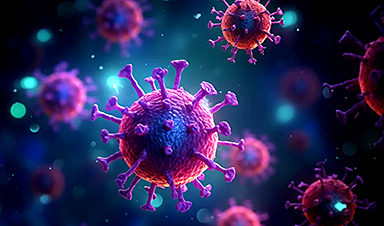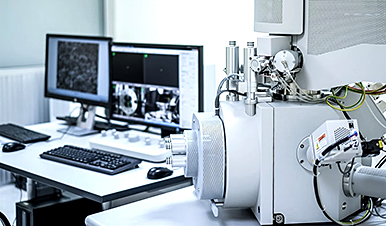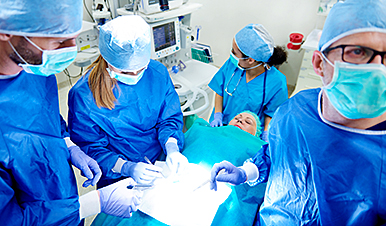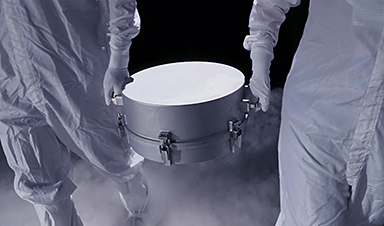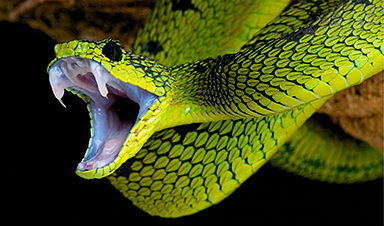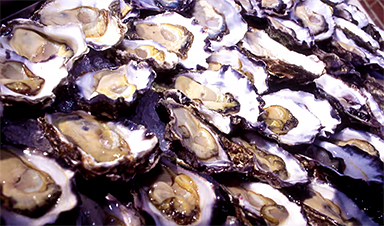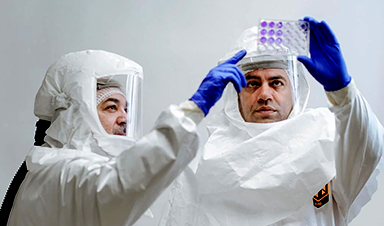A new mucosal COVID-19 vaccine poised to revolutionize the delivery process is especially beneficial for those with a fear of needles.
A next-generation COVID-19 mucosal vaccine is set to be a game-changer not only when delivering the vaccine itself, but also for people who are needle-phobic.
New Griffith University research, published in Nature Communications, has been testing the efficacy of delivering a COVID-19 vaccine via the nasal passages.
Professor Suresh Mahalingam from Griffith’s Institute for Biomedicine and Glycomics has been working on this research for the past four years.
Benefits of Live-Attenuated Vaccines
“This is a live attenuated intranasal vaccine, called CDO-7N-1, designed to be administered intranasally, thereby inducing potential mucosal immunity as well as systemic immunity with just a single dose,” Professor Mahalingam said.
“The vaccine induces strong memory responses in the nasal mucosa offering long-term protection for up to a year or more. It’s been designed to be administered as a single dose, ideally as a booster vaccine, as a safe alternative to needles with no adverse reactions in the short or long term.”

Live-attenuated vaccines offer several significant advantages over other vaccine approaches.
They induce potent and long-lived humoral and cellular immunity, often with just a single dose.
Live-attenuated vaccines comprise the entire virus thereby providing broad immunity, in contrast to a single antigen which is used in many other vaccine platforms.
Lead author Dr Xiang Liu said the vaccine provides cross-protection against all variants of concern, and has neutralising capacity against SARS-CoV-1.
“The vaccine offers potent protection against transmission, prevents reinfection and the spread of the virus, while also reducing the generation of new variants,” Dr Liu said.
“Unlike the mRNA vaccine which targets only the spike protein, CDO-7N-1 induces immunity to all major SARS-CoV-2 proteins and is highly effective against all major variants to date.
“Importantly, the vaccine remains stable at 4°C for seven months, making it ideal for low- and middle-income countries.”
Licensing and Future Prospects
The vaccine has been licensed to Indian Immunologicals Ltd, a major vaccine manufacturer.
Dr. K. Anand Kumar, co-author of the publication and Managing Director of Indian Immunologicals Ltd. Said: “We are a leading ‘One Health’ company that has developed and launched several vaccines for human and animal use in India and are currently exporting to 62 countries.”
“We have completed all the necessary studies of this novel COVID-19 vaccine which offers tremendous advantages over other vaccines. We now look forward to taking the vaccine candidate to clinical trials.”
Professor Lee Smith, Acting Director of the Institute for Biomedicine and Glycomics, said he was delighted with the research findings.
“These results towards developing a next-generation COVID-19 vaccine are truly exciting,” Professor Smith said. “Our researchers are dedicated to providing innovative and, crucially, more accessible solutions to combat this high-impact disease.”
Reference: “A single-dose intranasal live-attenuated codon deoptimized vaccine provides broad protection against SARS-CoV-2 and its variants” by Xiang Liu, Wern Hann Ng, Eva Zusinaite, Joseph Freitas, Adam Taylor, Venugopal Yerragunta, Shukra Madhaha Aavula, Sambaiah Gorriparthi, Santhakumar Ponsekaran, Rama Lakshmi Bonda, Priyanka Mani, Sridevi V. Nimmagadda, Sainan Wang, Laura Sandra Lello, Ali Zaid, Ujjwal Dua, Sharon A. Taft-Benz, Elizabeth Anderson, Victoria K. Baxter, Sanjay Sarkar, Zheng L. Ling, Thomas M. Ashhurst, Samuel M. S. Cheng, Priyabrata Pattnaik, Anand Kumar Kanakasapapathy, Ralph S. Baric, Felicity J. Burt, Malik Peiris, Mark T. Heise, Nicholas J. C. King, Andres Merits, Rajendra Lingala and Suresh Mahalingam, 26 August 2024, Nature Communications.
DOI: 10.1038/s41467-024-51535-y
News
Does COVID increase the risk of Alzheimer’s disease?
Scientists discover that even mild COVID-19 can alter brain proteins linked to Alzheimer’s disease, potentially increasing dementia risk—raising urgent public health concerns. A recent study published in the journal Nature Medicine investigated whether both mild and [...]
New MRI Study Reveals How Cannabis Alters Brain Activity and Weakens Memory
A massive new study sheds light on how cannabis affects the brain, particularly during cognitive tasks. Researchers analyzed over 1,000 young adults and found that both heavy lifetime use and recent cannabis consumption significantly reduced brain [...]
How to Assess Nanotoxicity: Key Methods and Protocols
With their high surface area and enhanced physicochemical properties, nanomaterials play a critical role in drug delivery, consumer products, and environmental technologies. However, their nanoscale dimensions enable interactions with cellular components in complex and [...]
Nanotech drug delivery shows lasting benefits, reducing need for repeat surgeries
A nanotechnology-based drug delivery system developed at UVA Health to save patients from repeated surgeries has proved to have unexpectedly long-lasting benefits in lab tests – a promising sign for its potential to help human patients. [...]
Scientists Just Found DNA’s Building Blocks in Asteroid Bennu – Could This Explain Life’s Origins?
Japanese scientists detected all five nucleobases — building blocks of DNA and RNA — in samples returned from asteroid Bennu by NASA’s OSIRIS-REx mission. NASA’s OSIRIS-REx mission brought back 121.6 grams of asteroid Bennu, unveiling nitrogen-rich organic matter, including DNA’s essential [...]
AI-Designed Proteins – Unlike Any Found in Nature – Revolutionize Snakebite Treatment
Scientists have pioneered a groundbreaking method to combat snake venom using newly designed proteins, offering hope for more effective, accessible, and affordable antivenom solutions. By utilizing advanced computational techniques and deep learning, this innovative [...]
New nanosystem offers hope for improved diagnosis and treatment of tongue cancer
A pioneering study has unveiled the Au-HN-1 nanosystem, a cutting-edge approach that promises to transform the diagnosis and treatment of tongue squamous cell carcinoma (TSCC). By harnessing gold nanoparticles coupled with the HN-1 peptide, [...]
Global Trust in Science Is Stronger Than Expected – What’s Next?
A landmark global survey conducted across 68 countries has found that public trust in scientists remains robust, with significant support for their active involvement in societal and political matters. The study highlights the public’s [...]
Microplastics in the bloodstream may pose hidden risks to brain health
In a recent study published in the journal Science Advances, researchers investigated the impact of microplastics on blood flow and neurobehavioral functions in mice. Using advanced imaging techniques, they observed that microplastics obstruct cerebral blood [...]
AI Surveillance: New Study Exposes Hidden Risks to Your Privacy
A new mathematical model enhances the evaluation of AI identification risks, offering a scalable solution to balance technological benefits with privacy protection. AI tools are increasingly used to track and monitor people both online [...]
Permafrost Thaw: Unleashing Ancient Pathogens and Greenhouse Gases
Permafrost is a fascinating yet alarming natural phenomenon. It refers to ground that remains frozen for at least two consecutive years. Mostly found in polar regions like Siberia, Alaska, and Canada, permafrost plays a [...]
Frequent social media use tied to higher levels of irritability
A survey led by researchers from the Center for Quantitative Health at Massachusetts General Hospital and Harvard Medical School has analyzed the association between self-reported social media use and irritability among US adults. Frequent [...]
Australian oysters’ blood could hold key to fighting drug-resistant superbugs
Protein found in Sydney rock oysters’ haemolymph can kill bacteria and boost some antibiotics’ effectiveness, scientists discover An antimicrobial protein found in the blood of an Australian oyster could help in the fight against [...]
First U.S. H5N1 Death Sparks Urgency: Scientists Warn Bird Flu Is Mutating Faster Than Expected
A human strain of H5N1 bird flu isolated in Texas shows mutations enabling better replication in human cells and causing more severe disease in mice compared to a bovine strain. While the virus isn’t [...]
AI Breakthrough in Nanotechnology Shatters Limits of Precision
At TU Graz, a pioneering research group is leveraging artificial intelligence to drastically enhance the way nanostructures are constructed. They aim to develop a self-learning AI system that can autonomously position molecules with unprecedented precision, potentially [...]
How Missing Sleep Lets Bad Memories Haunt Your Mind
Research reveals that a lack of sleep can hinder the brain’s ability to suppress unwanted memories and intrusive thoughts, emphasizing the importance of restful sleep for mental health. Sleep deprivation has been found to [...]
